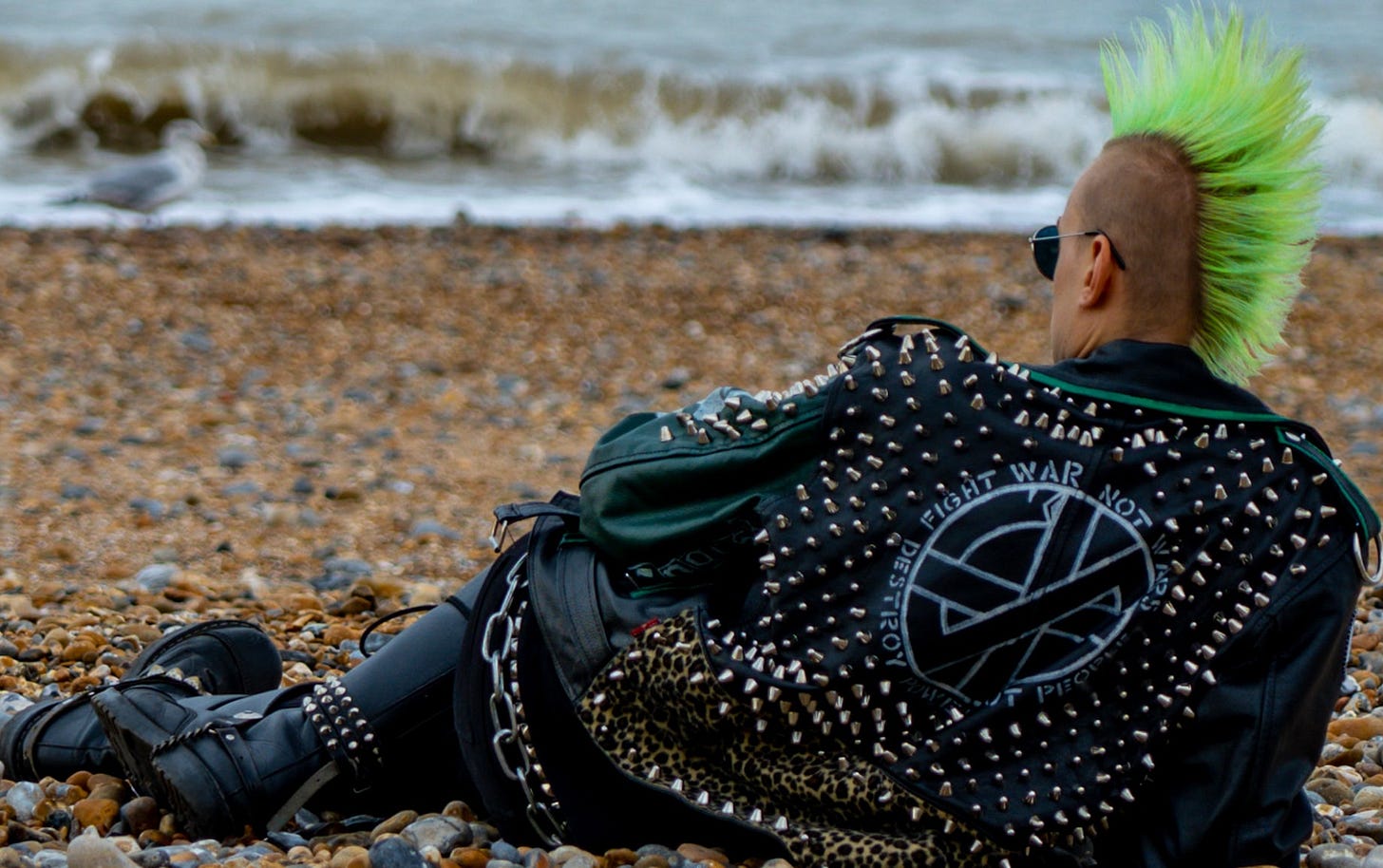I love the punk rock aesthetic. I like the nonconformity, the edginess, the gender-bending, the DIY quality. I love leather and spikes and patches.
“Punk rock was invented so ugly kids could be popular,” someone once said. Maybe so—I was never one of the beautiful people. Not that I was punk, either. That wasn't a subculture in my rural high school. I've always been jealous of those who say they survived a hostile school environment by joining the goths, or the nerds, or the metalheads. Mine had only two classes: popular and riff-raff. And I was not popular.
But I admired punks, who at minimum, seemed tough. I just finished reading The Problem with Everything, and as author Meghan Daum points out, we gen-Xers cared about toughness. We played rough, blew off insults, prided ourselves on managing at home alone and couldn't wait to move away from our parents. Punk was in its prime when we came of age. Punks got piercings, tattoos, and haircuts that precluded employment in ordinary jobs. They smoked and did drugs. Some of them looked like they could kick your ass.
But now every suburban teen gets piercings, tattoos, and haircuts that... well, used to preclude employment, before we had so many coffee shops. And although laws and PSAs have rendered old-school smoking taboo, vaping is common, and the use of even heavy drugs has gone ever more mainstream. With teen anxiety on the rise, I guess it isn't surprising if drugs compete with trigger warnings and safe spaces as a shield from unpleasant realities. And Hot Topic, a store that sells watered-down punk-adjacent clothing, has passed its thirty year anniversary with little change to its look. Nothing says edgy nonconformist like wearing the same plaid pants and fuchsia hair dye your mom wears.
For a while, it's been my contention that punk used to be tough, but it lost its edge. Now I'm thinking it was never so tough.
Take its sexism problem. The favored path to punk for women has long been a sort of “reclaimed” sluttiness. But the Madonna/whore dichotomy is patriarchal, and women don't escape it by climbing out of one of its cages and into the other. For women, it would be more punk rock to reject the paper doll stereotypes and claim our rightful place as confident, self-actualized humans. For men, it would be more punk rock to depart from the religious fundamentalists who brought us the ritualized subjugation of women.
The word punk once meant “prostitute.” Supposedly, its migration from “harlot” to “hoodlum” explains its current use. But early punk rockers glamorized addiction, and a hardened addict will sell his body for a hit, and “punk” spent a moment as a synonym for homosexual. So punk is as close to gay as it is to roughneck, and fancies itself a champion of sexual minorities, racial minorities, the working class, women, and anyone living on the fringe. Now that’s punk rock. But the punk that brought us Lola and Walk on the Wild Side has abandoned the gender-bending, gay roots of transsexual culture, elevating straight men who've redefined “queer” as more worthy than the gays, lesbians and feminists they emulate. From punk grew Antifa, famous for the San Francisco art exhibit that encouraged viewers to kill recalcitrant women with “baseball bats covered in barbed wire,” axes and other weapons. Talk about “toxic masculinity.” It would be more punk rock not to hate women. It would be more punk rock not to join the ranks of the men who abuse and murder them.
And I guess chaining yourself to addiction, whether you're a street criminal or a nervous kid, is a surrender, not a victory.
There's even a flashback in my book about a mild-mannered friend of Jamie's who went punk overnight, purchasing his way into the subculture with none of the necessary street cred.
I guess being a martyr for glam was never that tough, entailing as it does a submission to some pretty standard beauty ideals. For all its supposed edginess, punk rivals redneck and Republican in its reverence for sexy women and violent men.





I grew up in the Ventura/Oxnard punk scene in the late 90s/early 00s. Rode the hardcore wave into my early twenties. It was a wild time in my life. So many good, positive things (community, unity, belonging, kids who were better parents than my own) and so many bad (violence, alcoholism, drugs, darkness, raging rebellion). Do I regret it? Nope. Loved every moment of it. And I’m still ‘punk’ in spirit. You’re right about the nonconformist conformism. I remember being 18, 19 at a show and thinking, We all look exactly the same; we’re all wearing the same costume. Really there isn’t much difference between punks and yuppies; just the end goals, but both are worshiping something and rejecting something else, while wearing a costume to fit in.
Michael Mohr
‘Sincere American Writing’
https://michaelmohr.substack.com/